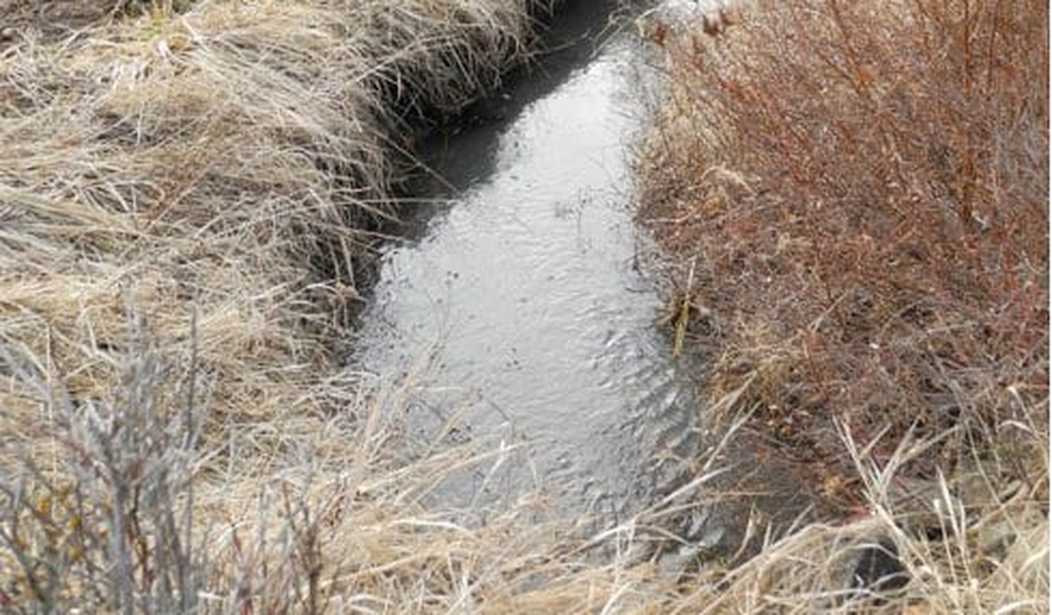WASHINGTON — Senators who have warned of a massive power grab with the Environmental Protection Agency’s “clarification” of protected waters are accusing the Obama administration of intentionally misleading the public to push the rule through.
Earlier this month, the EPA extended the public comment deadline on the “Waters of the United States” rule to Nov. 14. A final rule is expected in the spring.
In March, the EPA began a “robust” 90-day “outreach effort” to gather input in shaping a final rule, maintaining that the directive is simply a clarification effort needed to define streams and wetlands protection after Supreme Court decisions in 2001 and 2006.
Critics, though, charged that the administration embarked on an unprecedented breach of private property rights without scientific basis.
The EPA wants to cover “most” seasonal and rain-dependent streams, which account for about 60 percent of stream miles in the country, arguing they have “a considerable impact on the downstream waters.”
Wetlands “near rivers and streams” would be protected under the CWA, and “other types of waters [that] may have more uncertain connections with downstream water and protection will be evaluated through a case specific analysis of whether the connection is or is not significant.” Critics say this could be construed to even include ponds and ditches on private property.
Overall, the EPA stated, a third of waters in the U.S. don’t meet Clean Water Act standards.
Last week, 29 Republican senators sent a letter to EPA Administrator Gina McCarthy and Army Secretary John McHugh, because of the new powers the Army Corps of Engineers would have, criticizing the administration’s insistence on pursuing “this unprecedented executive overreach, regardless of the consequences to the economy and to Americans’ property rights.”
“The proposed rule would provide EPA and the Corps (as well as litigious environmental groups) with the power to dictate the land use decisions of homeowners, small businesses, and local communities throughout the United States,” states the letter, led by Sens. John Barrasso (R-Wyo.), Mitch McConnell (R-Ky.), David Vitter (R-La.) and Ted Cruz (R-Texas). “With few exceptions, it would give the agencies virtually unlimited regulatory authority over all state and local waters, no matter how remote or isolated such waters may be from truly navigable waters. The proposed rule thus usurps legislative authority and Congress’s decision to predicate Clean Water Act jurisdiction on the law’s foundational term, ‘navigable waters.’”
“Because the proposed ‘waters of the United States’ rule displaces state and local officials in their primary role in environmental protection, it is certain to have a damaging effect on economic growth. Increased permitting costs, abandoned development projects, and the prospect of litigation resulting from the proposed rule will slow job-creation across the country. Similar concerns led the Small Business Administration’s Office of Advocacy (SBA) to recently call for the withdrawal of the proposed rule.”
The EPA constructed a special Web portal on the rule saying that it would not “regulate groundwater” or “expand jurisdiction over ditches.” The rulemaking, it says, was requested by “many stakeholders.”
But the senators say the assertion that the EPA was called to make such clarifications to the Clean Water Act is “wholly misleading.”
“A request for a regulatory clarification does not provide a license to run roughshod over the property rights of millions of Americans. Yet the Obama Administration has used prior rulemaking requests as an excuse to unilaterally advance a regulatory agenda that defies the jurisdictional limits established by Congress when it enacted the Clean Water Act in 1972,” they wrote.
“In fact, the proposed rule would harm the very landowners, small businesses, and municipalities that expressed interest in working with EPA and the Corps to address Clean Water Act jurisdictional issues.”
The GOP lawmakers said the administration was showing bias by arguing that those who “choose clean water” should endorse the rule, and noted how McCarthy has referred to some questions about the rule as “ludicrous” or “silly.”
“Belittling the proposal’s critics only furthers the impression that EPA has predetermined the outcome of the ‘waters of the United States’ rulemaking,” the senators wrote.
They also charge that the EPA and the Corps have erroneously claimed that “impacts associated with increased Clean Water Act jurisdiction are insignificant.”
For example, they noted the Corps has stated “when privately-owned aquatic areas are subject to Clean Water Act jurisdiction . . . [that] results in little or no interference with the landowner’s use of his or her land.”
“These assertions strain credulity. Given the history of regulatory and land use issues associated with the Clean Water Act (including numerous congressional hearings, Supreme Court cases, and real world examples of costs and hardship resulting from affirmative jurisdictional determinations), it is astonishing that any federal agency would claim that a designation of private property as ‘waters of the United States’ does not affect the landowner’s property rights,” the GOPs argued.
“That such statements have come from EPA and the Corps suggests that the agencies either don’t appreciate the real-world impacts of the law they’re charged with administering, or they are intentionally trying to minimize the effect of the proposed rule.”
Lawmakers also contend that the EPA may be running afoul of the Anti-Lobbying Act by enlisting supporters to promote the rule on social media.
“The integrity of the rulemaking process is in jeopardy, if not already tainted. EPA’s social media advocacy removes any pretense that the agency will act as a fair and neutral arbiter during the rulemaking,” they wrote.
“…It is as though the administration and its environmentalist allies are of one mindset, eager to paint the proposed rule’s critics as anything other than concerned citizens.”
To counter rulemaking “plagued by administrative bias and prejudicial grandstanding,” the senators said, the rule must be withdrawn.
Sen. Johnny Isakson (R-Ga.), one of the signatories on the letter, said the rule “could allow federal bureaucrats to assert control over thousands of streams, creeks, wetlands, ponds and ditches throughout the country.”
“This latest overreach by the Executive Branch would provide the administration, as well as environmental groups, with a powerful tool to delay and prevent development and land use activities on property owned by homeowners, farms, small businesses, and municipalities,” Isakson said Friday. “This proposal will harm not only landowners, but our entire agriculture industry in Georgia.”
The rule has even made it onto the campaign trail, with Rep. Steve King (R-Iowa) noting in a debate last week with Democratic congressional candidate Jim Mowrer that the EPA aims to “regulate everything all the way up to and maybe including the kitchen sink.”
“And we can’t have a federal government that’s going to change the rules,” King said.
The Natural Resources Defense Council said last week that environmental groups presented to the EPA comments from “more than 700,000″ Americans in support of the water rule.
Clean Water Action President and CEO Bob Wendelgass, one of the groups that rounded up support, said incidents like this summer’s toxic algae tainting of Toledo’s water supply demonstrate the need for the rule.
“The American people expect their government to protect their water. They do not want some of the interest groups who oppose this rule to be deciding what’s best for our water,” Wendelgass said. “That’s why more than 700,000 people have spoken up, telling EPA and the Corps that they support the proposed rule to protect small streams and wetlands.”
In an op-ed at the end of September, McCarthy argued the rule is an “economic necessity.”
“A cleaner Boston Harbor has meant higher property values, more shipping, and more jobs,” the EPA administrator said. “In 2012, more than 50,000 jobs in Boston were tied to port activity — from cargo and seafood processing to cruises and harbor tours.”
“…To have clean water downstream in our rivers and lakes — and enjoy the economic growth clean water brings — we need healthy headwaters upstream.”









Join the conversation as a VIP Member